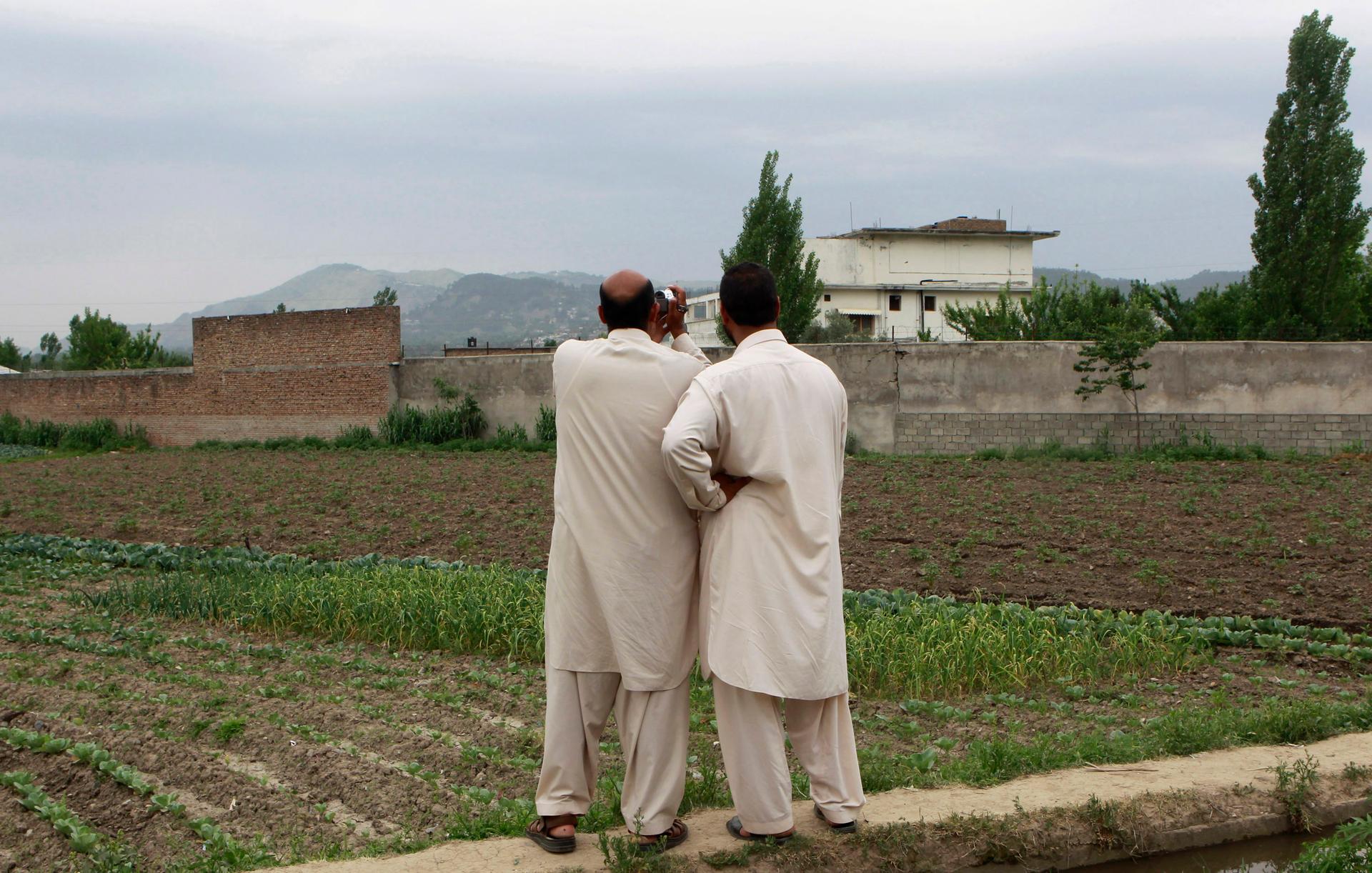The Pakistani doctor who reportedly helped the CIA find bin Laden is still stuck in prison
On May 5, 2011 in Abbottabad, Pakistan, residents record video footage of the compound where al-Qaeda leader Osama bin Laden was killed in a US special operations raid days earlier.
This Sunday marked five years since a team of US Navy SEALs killed Osama bin Laden during a CIA-led raid on the al-Qaeda leader's compound in Abbottabad, Pakistan. The agency celebrated by tweeting details about the raid as though it were happening live.
One person whose name didn't make it into the CIA's tweet storm: Shakil Afridi, the Pakistani doctor who reportedly helped the agency try to confirm that bin Laden was living at the compound.
While the CIA was tweeting, Afridi remained locked up in a Pakistani prison.
If you know anything about the story of how US President Barack Obama ended up ordering the raid on bin Laden's compound, then maybe you've heard bits and pieces about the role Afridi played in finding and killing the world’s most-wanted terrorist.
Afridi, a doctor and health official in Pakistan’s Khyber tribal region, headed up a vaccination campaign in the suburb where bin Laden's suspected compound was located. It turns out that program was no ordinary public health initiative. It was a CIA operation designed to confirm bin Laden's presence in Abbottabad by collecting DNA from one of his family members.
Pakistani officials were infuriated that they hadn’t been notified about the raid, and the country’s Inter-Services Intelligence Agency (ISI) soon arrested Afridi over his role in tracking bin Laden. A judicial commission recommended trying him for treason. He was sentenced to 33 years in prison in 2012 — surprisingly not for his CIA work, but rather for a ransom payment made on his behalf to the Lashkar-e-Islam militant group, which had abducted Afridi in 2008. Pakistan said it constituted financial support for a terrorist group.
Lashkar-e-Islam wasn’t especially appreciative, though. Lashkar commander Abdul Rasheed responded to the sentence by threatening to kill Afridi for working with the CIA. "[W]e will kill the foreign agent, if we get the opportunity," Rasheed said, according to CBS News.
It’s unclear whether Afridi and his health workers successfully collected any DNA from the bin Ladens, or how much he actually knew about the purpose of the vaccination program, about his handlers and about the target of the intelligence gathering, a recent investigation by National Geographic found.
Regardless of what Afridi did or didn’t know, US officials have talked about him as though he were a key asset in the hunt for bin Laden.
Former US Defense Secretary Leon Panetta, who was director of the CIA when the bin Laden raid took place, confirmed during a “60 Minutes” interview in January 2012 that Afridi had worked for the CIA.
"This was an individual who in fact helped provide intelligence that was very helpful with regards to this operation," Panetta said. "He was not in any way treasonous towards Pakistan. He was not in any way doing anything that would have undermined Pakistan."
The US Senate Appropriations Committee voted unanimously in May 2012 to cut aid to Pakistan by $33 million dollars — a symbolic response to Afridi’s 33-year sentence.
Hillary Clinton, who was serving as secretary of state at the time of the raid, also spoke out on behalf of Afridi.
“The United States does not believe there is any basis for holding Dr. Afridi,” Clinton said in response to his sentencing. “His help, after all, was instrumental in taking down one of the world’s most notorious murderers. That was clearly in Pakistan’s interests, as well as ours and the rest of the world. This action by Dr. Afridi to help bring about the end of the reign of terror designed and executed by bin Laden was not in any way a betrayal of Pakistan. And we have made that very well known and will continue to press it with the government of Pakistan.”
Afridi’s conviction was overturned in 2013, but he remains in prison awaiting a new trial. He now also faces charges over the death of a patient in 2005.
The five year anniversary of the Abbottabad raid may not have earned Afridi a named role in the CIA’s Twitter account, but it did get him the attention of a man who’s very good at getting attention himself: Donald Trump.
The Republican presidential front-runner waded into the controversy surrounding Afridi's imprisonment during a recent interview on Fox News in which he said he’d get Afridi released in "two minutes."
"I would tell them let [him] out and I'm sure they would let [him] out," Trump said. "Because we give a lot of aid to Pakistan."
Trump's statement drew a strong response from Pakistani Interior Minister Chaudhry Nisar Ali Khan, who released a statement on Monday saying that Pakistan had sole authority to handle Afridi’s case.
“[N]obody else has the right to dictate to us about his future,” Khan said. “Trump’s statement only serves to show not only his insensitivity, but also his ignorance about Pakistan.”
“Contrary to Mr. Trump’s misconception,” he added, “Pakistan is not a colony of the United States of America. He should learn to treat sovereign countries with respect.”
The CIA’s Twitter event ended with this tweet.
But as long as Shakil Afridi remains in prison, the story of the raid that killed Osama bin Laden isn’t over yet.
We want to hear your feedback so we can keep improving our website, theworld.org. Please fill out this quick survey and let us know your thoughts (your answers will be anonymous). Thanks for your time!
